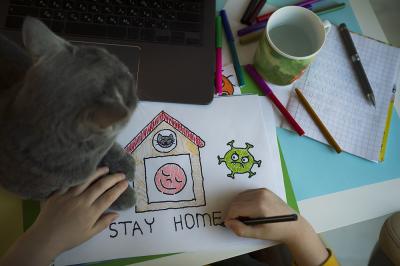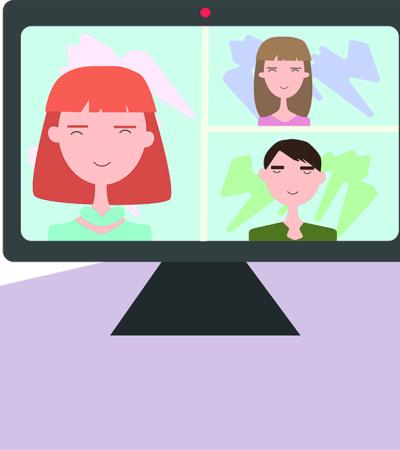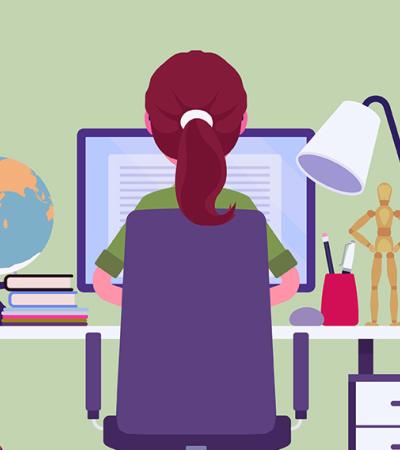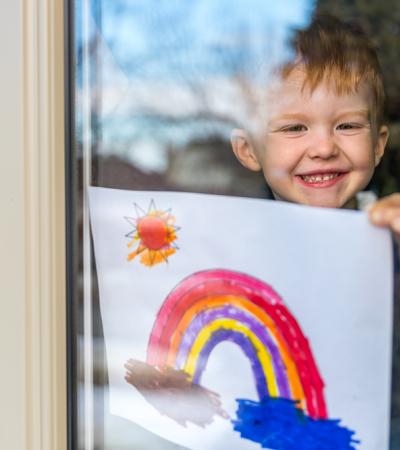As we approach May still in quarantine, we wanted to share how our library programming is continuing to roll along in the midst of the pandemic. We have learned some amazing things about ourselves, our library programming and what our school community needs.
In this blog post, we’ll talk about some of the lessons learned, how our programming is holding up, and what we see as necessary as we continue in this brave new normal.

Embracing the video camera and organizing our email
We’ve gotten over being camera- and video-shy. The number of Zoom and Teams meetings that we have been involved in makes our heads spin.
On day 1, we presented our polished and professional image. By day 14, we realized that coming to the computer in our favorite relaxed t-shirt was OK. And if we had a dog barking, husband or kids in the background, or a crazed cat meowing for attention and walking on the keyboard — so be it!
We also (with varying degrees of success) learned how to organize our emails, which came at us fast and furious. There was so much email it was anxiety producing. Learning to organize emails, set up a schedule for answering them and taking the district email off our mobile devices saved the day.
For us, logging into email first thing in the morning, answering ones that needed to be answered immediately, then logging out until mid-day was the answer. Answering emails before the end of the day and giving ourselves permission to close our laptops helped to manage the anxiety over the sheer volume of emails.
If book clubs can happen online, so can office hours
Online book clubs became the social event of the season. Just as our schools went into learning in a digital environment, we had been poised to do our second year of Read Woke. Many of our schools had been planning book clubs for weeks, if not months that would involve faculty and students reading one selected book. One of the top choices was "Just Mercy" by Bryan Stevenson. We kept that programming rolling through video conferencing and discussion boards.
Just as we did when we were in the building, we attend department and leadership team meetings and we continue to market and assist with access to online resources. Online office hours could be used to collaborate with teachers and with students. We had office hours via Teams and Zoom and were available to assist with technology issues as well as collaborate on projects. We owe the New York City school system some gratitude as their Translation of Practice document helped us to make the leap from face-to-face to online school librarianship.
Digital tool access is non-negotiable
Access to digital tools is not a luxury; it's an essential. It’s something that every student needs and deserves.
As our district scrambled to ensure our students had a computer and wifi at home, we curated our digital resources. What we discovered was astounding: there’s actually a huge portion of our county without access to high speed internet. This made the digital divide more apparent and more divisive than ever.
We know that students, parents and teachers are spending a tremendous amount of time online for news, entertainment and social connections. Our expertise in teaching THE literacies and collaboration is invaluable. Continuing to support digital citizenship, media and information literacy remains a focus of our digital programming.
Public library partnership
Partnering with the public library is one of the greatest benefits to our students and ourselves. Our students had access to a digital public library card and online tutoring and online resources that they were familiar with before they needed them! Shout out to the team at Calvert Library who have helped us make this transition — they have provided support in so many ways to our schools, school librarians and families.
Problem solving and collaboration happen at a distance
In Maryland, we celebrate books with the Black Eyed Susan Award through the Maryland Association of School Librarians (MASL). This year, just as activities were getting under way for this year’s voting, schools closed.
Rather than shrug shoulders, programming went on. One of the librarians in our district contacted publishers to get permission for read-alouds for all of the books. MASL made the link to vote public so that students could vote even if they were not in school.
Remember to breathe
Finally, we learned that we need to take some time to breathe. Not everything is going to be finished quickly, not everything is going to go the way we hoped.
Taking time out to enjoy the spring weather, the flowers blooming and spending time with our families has helped to alleviate stress and keep us emotionally charged to continue to connect and offer programming to our students and communities.
How is your programming changing? What does your new “normal” look like? Let us know in the comments. We would love to hear from you.



